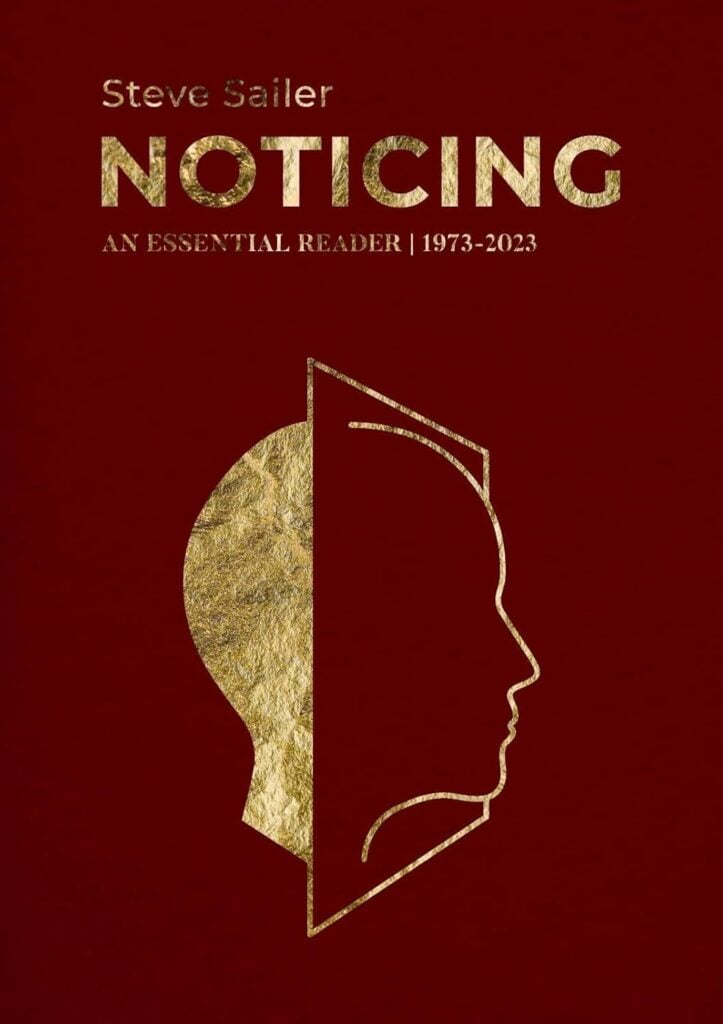Noticing: An Essential Reader (1973-2023)
by Steve Sailer
Passage Publishing
458 pp., $29.95
When it comes to political and cultural commentary, Steve Sailer is one of the most influential writers whom most people have never heard of. But if they listen to any popular podcast, conservative or progressive, they will come to see that Sailer’s arguments and even his style of argument are ubiquitous. Exiled for harboring politically incorrect positions on various issues, he has nevertheless continued writing regularly for three decades, knowing that the right people are reading him.
Of course, some people still try to label Sailer a racist kook devoid of principle. The most recent example can be found in The Atlantic, which published an article attacking Sailer’s character without addressing any of his arguments (“The Far Right Is Becoming Obsessed With Race and IQ,” August 2024). Supposedly, Sailer and others who dare to examine data on race “are shrouding bigotry in a cloak of objectivity and pseudoscientific journalism.” How this is so is anyone’s guess, since the claims of the essay itself rely on prejudiced assumptions and baseless inferences rather than facts.
Fortunately, this kind of emotive reasoning has lost much of its power in the wake of Donald Trump’s presidency and the rise of conservative populism. Compared to most writers, both now and in the past, Sailer speaks to the moment and has a firm grasp on what is happening around the world. This is demonstrated in the recent release of Noticing: An Essential Reader, a collection of Sailer’s most notable essays over the course of his long career. Not only does it showcase Sailer’s reliably clear, witty, and refreshingly candid writing style, but it also demonstrates his uniquely inductive approach to every controversy.
Although Sailer’s arguments are entirely defensible, his realist outlook automatically puts him at odds with those pushing an agenda. For example, when discussing America’s position in the world, Sailer’s inductive reasoning leads him to conclude that an interventionist foreign policy and open borders—as he famously puts it, “invade the world, invite the world”—are generally bad for normal Americans, even as they are good for the military-industrial complex and employers wanting cheap labor. “The reason a substantial number of Americans have been cajoled into believing it’s vile for white citizens to have any say in who their future fellow citizens will be is because promiscuous immigration is good for billionaires and Democrats,” he writes.
When reading Sailer’s essays from the early 2000s, it becomes evident that he knew well before anyone else that a reckoning was coming for the Republican Party in the form of a politician like Donald Trump. So long as the party continued to preach libertarian economics, interventionism, and a lax immigration policy, its actual base of white middle-class Americans would defect to the Democrats or stop voting altogether. In what he called the “Sailer Strategy,” Sailer simply looked at the voting data of the 2000 election (between George W. Bush and Al Gore) and explained that winning a greater share of the white vote would have won Bush the election much more easily. Sure enough, Trump fulfilled Sailer’s prophecy in 2016, to the befuddlement of all those who grounded their analysis in opinion-based political science instead of fact-based social science.
Since Sailer’s proposals are derived from conclusions reached by looking at the evidence instead of imposing hypotheses rooted in ideology, his conservatism looks more at what’s practical than at what’s morally or philosophically correct. This lies at the root of his focus on IQ and race.
Surprisingly, Sailer’s discussions of racial differences, or “human biodiversity,” are usually as qualified and circumspect as the available evidence allows: “I’m … sometimes asked why I notice more than most writers on [racial differences]. I reply that it helps to have a model in your head that corresponds fairly well with how the world works.”
As such, most of Sailer’s arguments on race concern properly defining terms. In his essay, “It’s All Relative,” Sailer attempts to answer the question, “Does race exist in a biological sense?” He makes his governing motives clear when he follows this question by declaring, “Race is hardly the most important thing in life, but it’s not so insignificant that we can blithely ignore it. We need to understand why, here and all over the world, racial conflicts keep
popping up their ugly heads.”
At no point does Sailer proclaim the superiority of one race over another or provide a definition based on irrational prejudice. Instead, he comes up with a definition that captures both the underlying genetic reality of race coupled with its communal dimension: “A racial group is an extended family that is inbred to some degree.” The significance of this definition is that it helps shed light on many international and domestic conflicts. Racial conflicts, as Sailer explains, are why the American military ultimately fails at establishing peace and stability in countries like Afghanistan or Iraq. It’s also why simply reducing race to a social construct leads to a pernicious form of identity politics that contradicts the ideas of citizenship and a common culture.
Even if Sailer’s approach seems appropriately nuanced and complex, he still runs afoul of the prevailing conventions surrounding race. For conservatives, there’s the convention of color-blindness, which refuses to recognize race in the first place; for progressives, race is fundamental to identity and is mostly a social construct, which implies that the differences between races are solely the result of environment, not biology. Thus, when Sailer talks about the physical superiority of black athletes, the high IQs of Ashkenazi Jews, or the middle-of-the-road testosterone levels of white men, he upsets both conservatives and progressives.
For the majority of people, however, Sailer’s observations just seem like common sense. Even so, owing to America’s ongoing intellectual decline, some of his observations are apparently harder to accept. In responding to the George Floyd riots, Sailer summoned mountains of data showing the much higher rates of criminal behavior among black men relative to all other races. Rather than leaving the matter there, Sailer brought in other factors that might explain this problem, such as hormone levels and cultural messaging. “Every culture has to deal with the inevitable problems caused by rampant masculinity,” he writes. “Lately, we’ve declared that all empirical evidence of bad behavior by blacks must be proof of white malevolence. Not surprisingly, this cultural collapse is inducing blacks to behave even worse.”
In itself, nothing about this statement is objectionable. Sailer identifies the need for redirecting male aggression to positive ends—a need common to all communities—and notes how this isn’t happening with American black men today. Yet in a world run by leftist elites who refuse to recognize racial differences and reflexively blame a biased system for disparities in the justice system, Sailer’s common sense is automatically smeared as white supremacist rhetoric.
Just as in his discussion of race, Sailer is surprisingly moderate in his views on IQ, neither extolling it as the key to all success nor condemning it as irrelevant pseudoscience. Rather, he hopes to cultivate a better understanding of disparate racial outcomes. “Compared to other factors that influence the human world, IQ ranks near the top of the list,” he writes, and yet “it’s an underexploited market niche” that journalists and commentators foolishly ignore.
Sailer cites the work of Prof. Arthur Jensen in considering the question of what IQ actually is. “Lurking behind IQ is a ‘general factor’ or ‘g’ that plays a role (of varying magnitude) in the accomplishment of any and every mental task, from taking a test to making a living,” he writes. Try as we might to come up with alternative theories of intelligence, Sailer rightly defends the use of g, which has proven to be a much more helpful, consistent metric.
For all that he writes about IQ, however, Sailer ends up with far more questions than answers. Clearly, IQ is the result of some mix of nature and nurture, but it’s difficult to determine a clear breakdown. Concerning those communities suffering from low IQs, Sailer remarks, “It appears likely that some combination of malnutrition, disease, inbreeding, lack of education, lack of mental stimulation, lack of familiarity with abstract reasoning and so forth can keep people from reaching their genetic potential for IQ.”
Beyond race and IQ, Sailer’s essays tackle a wide variety of interesting subjects: cousins marrying one another in Muslim countries; rape hoaxes on college campuses; the parallels between transgenderism and transracialism; Turkish indoctrination centers; victim culture among American Jewish elites; the sexual fetishes of postmodern philosopher Michel Foucault; adapting Evelyn Waugh’s novel The Loved One; Barack Obama’s Hawaiian politics; and the subtle artistry of golf course design.
As Sailer modestly admits, his topics don’t lead to any definite conclusions. “I don’t act as if I’ve reached the conclusive end of a topic because, from my perspective, there is no conclusion, just an endless network of cause and effect,” he writes. Thus, those hoping to save the West or some such project should probably look elsewhere.
Through it all, Sailer deserves enormous credit for taking the abundant criticism of his work in the most objective way possible. In the final essay of the collection, “What If I’m Right?,” Sailer eloquently responds to this cloud of detractors. Rather than present himself as a martyr for free speech or truth, most of his frustration comes from being right all along: “Many opinionators seem enraged over the idea that I might prove right. This tendency to personalize social science disputes always struck me as dim-witted, but apparently, the fear ‘What if Sailer is right?’ Is infuriating and/or terrifying to many.”
Let us hope, after reading Noticing, enough high-IQ people can dispel these fears and restore reason and honesty to American public discourse.


Leave a Reply